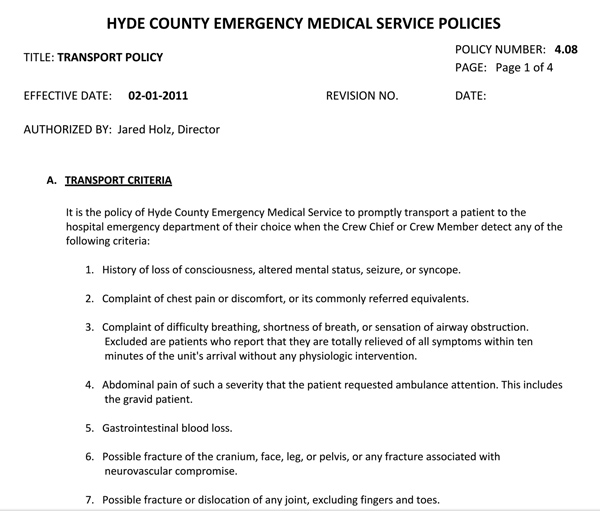Just a few days after the death of Portia Gibbs, 48, her husband, Barry, and her children Justin and Ashely shared with us that they were wounded by two assertions that had reached them about Portia’s death. They said that these assertions may have originated with Hyde County emergency management officials.
 Mr. Gibbs said he believes that the assertions were made to protect, or curry favor with Vidant Health, Inc — a corporation that donated $250,000 to Hyde County’s emergency services after purchasing and then closing the only hospital within 90 miles for many of its residents. Belhaven, North Carolina’s hospital had been closed at 12:01 am on July 2, 2014. Portia died on July 7.
Mr. Gibbs said he believes that the assertions were made to protect, or curry favor with Vidant Health, Inc — a corporation that donated $250,000 to Hyde County’s emergency services after purchasing and then closing the only hospital within 90 miles for many of its residents. Belhaven, North Carolina’s hospital had been closed at 12:01 am on July 2, 2014. Portia died on July 7.
When her heart began to fail, Portia was 75 miles from the nearest hospital, and, it seems clear that the decision to call for a helicopter rather that transport her by land was a direct result of the fact that Belhaven’s hospital, which is 28 miles closer, had shut its doors.
Portia’s husband, Barry, age 60, asked me if I knew if any of these statements were true. I said that I would find out. I spoke with Jared Holz, who literally “wrote the book” on policy and procedure for Hyde County Emergency Medical Service (he provided me the excerpt below). Holz is the former Emergency Services Director for Hyde County, and has 25 years of experience as a paramedic and as an emergency services supervisor, manager, and director in cities and towns up and down the eastern seaboard. Holz prefaced his remarks by relating that his statements are all based on second-hand understanding of the incident.
 Is it true that if a person is brought to the EMT unconscious, they are not allowed to move them?
Is it true that if a person is brought to the EMT unconscious, they are not allowed to move them?
Holz: No. It is every EMT’s responsibility to assess, treat, and if necessary transport any patient to the best of their ability based on their training. The only time you limit movement of a patient is in the case of trauma. But even then you take a life over limb approach to patient treatment. If this statement was made by an EMT or Paramedic in an EMS system, I would be greatly disappointed.
Is it true that an ambulance is equipped with all the same life-saving tools as an emergency room?
Holz: Any emergency room anywhere is better equipped than an ambulance to save a person’s life. An ALS or Paramedic level ambulance has some of the same medications found in the ER for treating many medical or traumatic emergencies, but not all of them. And it goes without saying that an ambulance doesn’t have the diagnostic equipment available in an emergency room such as X-Ray, CT scan, or Ultrasound, to name a few. An ambulance is also limited by the number of personnel, their level of training, and their comfort with acting on any particular issue.
By far, the assertion that bothered the Gibbs family the most was the one they characterized as, “She would have died anyway,” meaning the closing of Belhaven’s hospital did not impact Portia’s chance of survival.
I have met the person to whom they attribute this statement. He struck me as an earnest young man who would never intentionally say something to hurt anyone, let alone neighbors and friends who have just suffered a tragic loss. If it is true that he said these words, I’m sure he meant them not for the Gibbs family, but for the public. It is likely he said this, not necessarily to defend Vidant Health’s decision to close the hospital, but to prevent this tragedy from being framed in a political manner.
That said, when I shared with Mr. Holz what had been reportedly asserted, he was outraged. He said he would be extremely shocked to learn that such a statement came from anyone with experience in emergency services. He said the person who made this mistake has a lack of understanding of an EMS system.
Holz said that, based on what he has heard of the incident, Portia’s life could likely only have been saved by definitive treatment in a Catheterization Lab (a specialized room with diagnostic imaging equipment that can visualize the arteries and chambers of the heart and allow for some advanced procedures) or in an operating room with a cardiothoracic surgeon. The Belhaven hospital’s emergency room did not have either of those available. Thus, its role in saving Portia’s life would have been to stabilize her and/or to serve as a relay point from an ambulance to helicopter which would have taken her on to Vidant’s hospital in Greenville, NC (another 60 miles away).
“If Pungo Hospital were open, I would have immediately started transporting the patient to the hospital and done everything that I could en route,” Holz said. “If the helicopter was able to meet me before I reached the hospital, or meet me on the helicopter pad in Belhaven, I would have transferred her to the helicopter.”
READ MORE about why the hospital was closed

Based on my account, Holz said of Portia Gibbs, “It sounds like she had a medical emergency that resulted in a cardiac arrest. There is no magic formula for fixing that. I’ve been on an ambulance talking to patients when they went into cardiac arrest, some lived and some didn’t, and all of them were treated with the same procedures.”
But during our conversation, Holz kept returning to the assertion that Portia would have died with or without Belhaven’s hospital. He said:
To say a person would have died anyway is probably one of the most egregious statements you can make. What you need to be able to say, “We did everything we could and were unable to save her.” It sounds like the EMT’s and Paramedics that were treating Mrs. Gibbs did everything right. It sounds like they did everything within their power and that they used all of the available treatment options. In our profession, we need to know that we did everything we could. In addition, for the friends and the family who either witnessed what happened or hear about it later; they need to know that we did whatever we could. That’s part of the psychological healing process in death. Telling someone “they would have died anyway” is incredibly hurtful.
After our conversation, Holz emailed me a page from the Hyde County Emergency Medical Service Policy that he authored before leaving Hyde County. He pointed out that the very first scenario under which a patient SHOULD be transferred to an emergency room is loss of consciousness, the opposite of what Mr. Gibbs had been told:

There is hope, however, that tragedies like this one will be less likely in the future:
Please support Story of America with a tax deductible donation.
